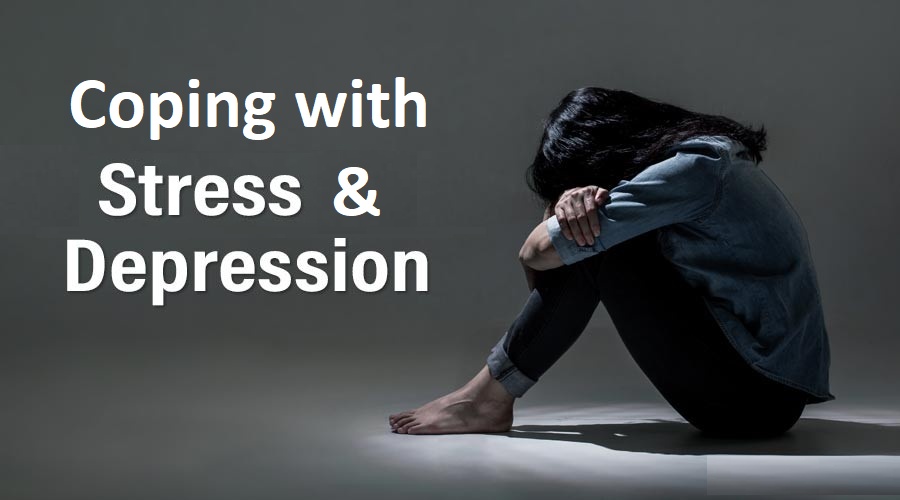Coping with Stress and Depression 2025

The Silent Struggles
You’re not alone if you’ve ever felt the weight of stress and depression bearing down on you. These invisible burdens can make even the simplest of tasks seem monumental. But here’s the thing – we all go through tough times. It’s part of being human. The key is learning how to cope healthily.
Sure, it’s easier said than done. But with the right tools and mindset, you can make it through even the darkest of days. So take a deep breath, grab a cup of tea (or coffee, if that’s more your thing), and let’s dive into some tried-and-true strategies for coping with stress and depression.
Understanding the Enemies
Before we get into the nitty-gritty of coping mechanisms, let’s take a moment to understand what we’re up against. Stress and depression are like those annoying houseguests that show up unannounced and refuse to leave.
Stress is that feeling of being overwhelmed or unable to cope with the demands of life. It can stem from work, relationships, finances, or any aspect of your day-to-day existence. And if left unchecked, chronic stress can lead to all sorts of physical and mental health problems. Talk about a party pooper.
Depression, on the other hand, is a mental health condition characterized by persistent sadness, loss of interest, and feelings of worthlessness or guilt. It’s like a dark cloud that follows you around, making it hard to find joy in the things you once loved.
Now, I know what you’re thinking – “This is getting a little too heavy for my liking.” But bear with me, because understanding these enemies is the first step in learning how to fight them.
Read More: NeuroSonography Programs
The Mind-Body Connection
One of the most important things to remember when coping with stress and depression is the mind-body connection. Yep, that’s right – your mental and physical health are intrinsically linked. Neglecting one can hurt the other.
So, what does this mean in practice? Well, for starters, it’s crucial to take care of your physical well-being. Exercise, eat a balanced diet, and get enough sleep. These seemingly simple things can do wonders for your mental state.
Think of it this way: if your body is a high-performance machine (and it is), then stress and depression are like throwing a wrench into the works. By taking care of your physical health, you’re essentially giving your mind the tools it needs to function at its best.
Mindfulness and Meditation
Okay, so you’ve got the mind-body connection down. Now let’s talk about mindfulness and meditation. These practices have been around for centuries, and good reason – they work!
Mindfulness is all about being present in the moment, rather than letting your mind wander to the past or worry about the future. It’s about paying attention to your thoughts, feelings, and physical sensations without judgment. Sounds simple enough, right? Well, it takes practice, but the benefits are worth it.
Meditation, on the other hand, is a bit more structured. It involves sitting or lying down in a quiet place and focusing your attention on your breath or a specific word or phrase (called a mantra). The goal is to calm your mind and achieve a sense of inner peace.
Now, I know what you’re thinking – “But I can’t sit still for that long!” Trust me, I’ve been there. But even just a few minutes of mindfulness or meditation each day can make a huge difference in how you cope with stress and depression.
Talk It Out
Sometimes, the best way to cope with stress and depression is to simply talk it out. And no, I’m not just referring to venting to your friends or family (although that can be helpful too). I’m talking about seeking professional help.
Therapy is nothing to be ashamed of. It’s a sign of strength and self-awareness. A good therapist can provide you with the tools and strategies you need to manage your mental health healthily.
Whether it’s cognitive-behavioral therapy (CBT), dialectical behavior therapy (DBT), or something else entirely, the right approach can help you identify and change negative thought patterns, develop coping mechanisms, and work through past traumas or issues.
And if you’re not quite ready to take the plunge into therapy, consider joining a support group. There’s something incredibly powerful about connecting with others who understand what you’re going through.
Self-Care Isn’t Selfish
When you’re in the thick of it, it can be easy to neglect your own needs. But self-care isn’t selfish – it’s essential. Think of it like putting on your oxygen mask before assisting others. You can’t pour from an empty cup, right?
So, what does self-care look like? Well, it can take many forms. Maybe it’s taking a long, hot bath with some soothing music and a glass of wine. Or perhaps it’s curling up with a good book or your favorite Netflix show. Heck, even something as simple as taking a walk in nature can do wonders for your mental well-being.
The key is finding what works for you and making it a priority. And don’t be afraid to get a little creative! Self-care can be anything that brings you joy, relaxation, or a sense of accomplishment.
Lean on Your Support System
You know that old saying, “It takes a village”? Well, it’s true – especially when it comes to coping with stress and depression. Your support system is invaluable, so don’t be afraid to lean on them when you need to.
Whether it’s your partner, family, friends, or even a pet (because let’s be real, furry friends can work wonders), having a solid support system can make all the difference. These are the people (or animals) who love and care about you, and they want to see you happy and healthy.
But here’s the thing – you’ve got to let them in. It can be tempting to put up walls and try to go it alone, but that’s only going to make things harder in the long run. Be open and honest about what you’re going through, and don’t be afraid to ask for help when you need it.
And if your support system seems a little lacking, consider joining a community group or getting involved in a cause you care about. Building new connections and feeling like you’re part of something bigger than yourself can be incredibly therapeutic.
FAQs
Q: What’s the difference between stress and depression?
A: While stress and depression can be related, they are distinct experiences. Stress is a natural response to challenging situations or demands, while depression is a persistent low mood or loss of interest that can significantly impact daily life. Stress can contribute to or exacerbate depression, but they are not the same thing.
Q: How do I know if I need professional help?
A: If your stress or depression is interfering with your ability to function normally or enjoy life, it may be time to seek professional help. Other signs include persistent sadness, hopelessness, difficulty sleeping or concentrating, changes in appetite, and thoughts of self-harm. Don’t hesitate to reach out for support.
Q: Can exercise help with stress and depression?
A: Absolutely! Exercise has been shown to have numerous mental health benefits, including reducing stress and alleviating symptoms of depression. It releases endorphins, which can improve mood, and can also serve as a healthy outlet for pent-up emotions.
Q: How long does it take for coping strategies to work?
A: There’s no one-size-fits-all answer, as everyone’s journey is different. Some coping strategies may provide relief relatively quickly, while others may take more time and consistency to see results. The key is to be patient and persistent, and don’t get discouraged if something doesn’t work right away.
Q: Can medication help with depression?
A: In some cases, yes. Antidepressant medication can be an effective treatment for depression, particularly when combined with therapy and other coping strategies. However, medication should always be prescribed and monitored by a qualified healthcare professional.
Conclusion
Coping with stress and depression can feel like an uphill battle, but you don’t have to go it alone. By understanding these invisible struggles, prioritizing self-care, and leaning on your support system, you can equip yourself with the tools to weather even the toughest of storms.
Remember, there’s no shame in asking for help. It’s a sign of strength and courage. And while the journey may not be easy, know that brighter days are ahead. Keep fighting, keep coping, and keep believing in yourself.
At the end of the day, you’ve got this. And if you ever find yourself doubting that, just refer back to this guide – your trusty roadmap to navigating the ups and downs of life with grace and resilience.
Disclaimer: The information provided in this article is for general educational purposes only and should not be considered as professional medical advice. If you are experiencing symptoms of depression, severe stress, or any other mental health condition, it is important to consult with a qualified healthcare professional. This article does not replace the need for proper diagnosis, treatment, or guidance from a licensed mental health provider.

